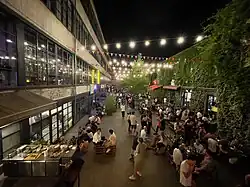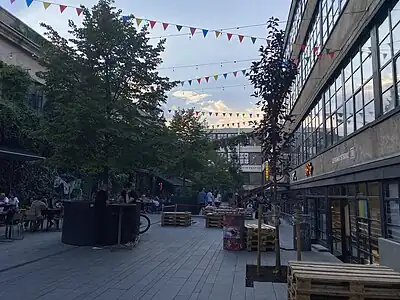| Fabrika Tbilisi | |
|---|---|
ფაბრიკა თბილისი | |
 | |
| General information | |
| Address | 8 Egnate Ninoshvili St., Tbilisi 0102, Georgia |
| Town or city | Tbilisi |
| Country | Georgia |
| Inaugurated | 2016 |
Fabrika Tbilisi (ფაბრიკა თბილისი) is a multi-functional urban space in Georgia’s capital city, Tbilisi. It was previously a sewing factory during the Soviet Union era.
History
Fabrika Tbilisi is a former sewing factory called "Nino" that dates from the Soviet period. It was one of the biggest in Tbilisi and produced women garments that constituted stylish fashion-designer clothes.[1] The production building had consistent revenue until the end of the 80's when it started to get less traction.
The building is found at the same exact location and kept the same address name under 8N Ninoshvili street. Fabrika is now in one of the city's central location, within the old part of Tbilisi near the Marjansishvili Theatre. The location was "abandoned for decades with no use to the neighbourhood and society."[2]
Preservations from the original factory
Adjara Group Hospitality partnered with MUA (Multiverse Architecture)[2] to design the multi-faceted space. Launched in 2016 and with a property size of 7,500.00 m2, the teams were in agreement to conserve as much of the original facets of the building as possible.[3] They kept the walls plain and only changed the floors or ceilings where it was necessary.[2] Old appliances are also recycled within the interior arrangements. The building’s exterior is mostly intact and acts as a canvas for the featured street art.[2]
Design
Fabrika Tbilisi's provisional program consists of space rentals, a hostel and cultural programs.[3]
The hub provides apartment style suites, shared dormitories and private rooms.[4] It is today the region's biggest youth hostel.[3]

21 residents make up the boutiques included in Fabrika Tbilisi. Bars, cafes, and restaurants like "Shio Ramen" offer culinary experiences from outside the country or highlight natural wines from Georgia's terroir at "Saamuri Wine Bar".[5] Featured boutiques from local vendors include artist studios like "CRU Graffiti Shop" and "Flying Painter", alongside shops like "Vodkast Records" and "Tsibakha Game Club".[6] In addition, a plant shop, skate shop boutique and ceramics goods at "Ceramic Studio 1300" are also present.[7] Educational institutions and a co-working space also make up the cultural center.[2]
A meter-long inner open style courtyard exists between three building blocks.[2][4] Organized events tend to take place in its gathering space such as workshops, markets and exhibitions.[8]
Reception
Fabrika is considered one of Tbilisi's biggest success stories.[9] According to a policy paper with the contribution of notably the Georgian National Commission for UNESCO, it's been representing a "national success case of a commercial creative cluster."[3] The team's mission behind the transformed space, according to Forbes Georgia, is about becoming a "youth hub—a place where new relationships will be born, where Georgian and foreign travelers or students will gather together and plan the future."[4]
Impact on the neighbourhood
The revitalization of the space also offered a boost of traction in its district. According to an established architecture and design company trusted by industry leading firms, Fabrika’s rapid engagement made it a popular attraction in the Marjanishvili sector while simultaneously becoming the go-to site within a now popular artistic and hipster area.[2] MUA is also aware of its accusations of Fabrika's engagement of gentrification and questions their sustainability in the city.[9]
Tbilisi's youth
Some Georgians do think of Fabrika only as a commercial and marketing decision.[10] The development of urban spaces are then expressed by the Tbilisan youth itself and how they may be “embedded within a corporate profit logic.”[10] According to Keti, a young adult Georgian woman, Fabrika is a space where she feels comfortable openly talking "despite its very commercial appearance."[10]
There is also a possibility of reinforcing the need for counter-culture in the capital, therefore a "rugged culture of Tbilisi’s creative youth"[11] through Fabrika Tbilisi.
References
- ↑ ""Nino" Soviet Sewing Factory - Experience Georgia, Tbilisi by connecting to its history, people and culture through Fabrika Hostel". Exposure. Retrieved 2023-11-07.
- 1 2 3 4 5 6 7 "Fabrika Tbilisi | MUA - Architecture & Placemaking". Archello. Retrieved 2023-11-03.
- 1 2 3 4 Nadirashvili, Nikoloz (1 December 2021). "Designing a Creative Cluster Ecosystem in Georgia" (PDF). POLICY PAPER.
- 1 2 3 ხვედელიძე, ხათუნა (2016-10-27). "ბედნიერების "ფაბრიკა"". Forbes Georgia (in Georgian). Retrieved 2023-10-27.
- ↑ "Saamuri Wine Bar | Residents | Fabrika". Retrieved 2023-11-07.
- ↑ "Our Residents | Fabrika". fabrikatbilisi.com. Retrieved 2023-11-07.
- ↑ "ფაბრიკა". AT (in Georgian). 2018-05-30. Retrieved 2023-11-03.
- ↑ "Events | Fabrika". fabrikatbilisi.com. Retrieved 2023-11-07.
- 1 2 Goff, Samuel (21 November 2018). "Regenerating Georgia: the architects behind Tbilisi's Fabrika look beyond the capital". New East Digital Archive.
- 1 2 3 Priemer et al. (2019). Limits and Potentials of Tbilisi’s Youth Culture. [Field Report, Goethe University Frankfurt]. https://socialjustice.org.ge/uploads/products/pdf/Counter_Culture_1560772348.pdf
- ↑ Dooley, Patrick (2017-05-08). "Fabrika and the Corporatization of Tbilisi's Counter-Culture". Post Pravda. Retrieved 2023-11-03.